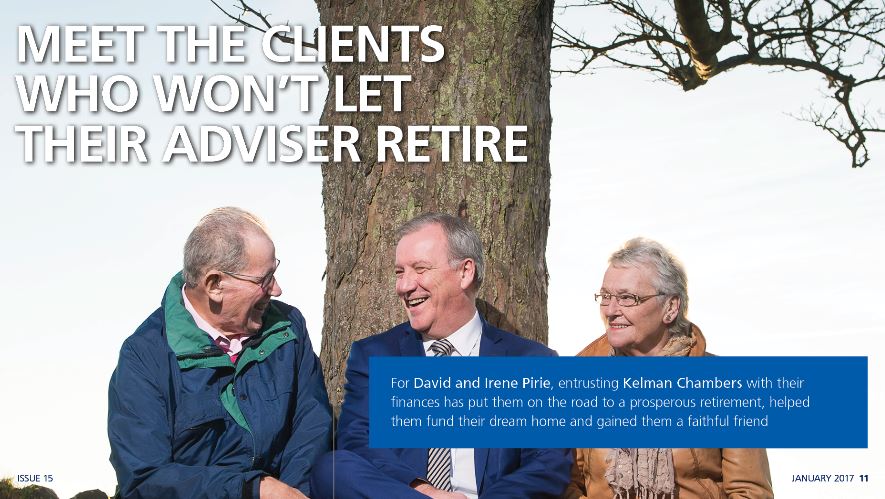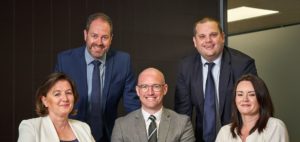News
Meet the Clients Who Won’t Let Their Adviser Retire

Our very own Financial Director, Kelman Chambers, was recently featured in the January issue of Zurich’s ‘Advice Matters’ magazine, where two of his loyal clients discuss how Kelman’s advice has put them on the road to a prosperous retirement:
Retired architect, David Pirie, 75 and his wife Irene, 73, first sought financial advice in their late 40s, but it was in their 60s that the couple from Upper Largo, Fife, discovered just how valuable a good adviser can be…
David and Irene:
Kelman was an employee of our previous financial adviser. We took to him immediately and trusted his advice, which has proved to be excellent over the years. Right from the start, we realised he was a genuine person.
We feel that Kelman has always been interested in us and our future wellbeing, and isn’t mechanically going through a checklist. He’s keen that everything turns out well for us and that means a lot to both of us.
Although I’m a professional architect, I don’t pretend to understand the ins and outs of the financial markets. We rely on Kelman to interpret things for us. He is a steady, reassuring man. He explained to us that there will be highs and lows and not to worry about it: it evens out at the end of the day. Given our age, we might be inclined to worry, but Kelman’s advice takes the worry away.
At one point Kelman reviewed all of our investments and questioned why we had decided to cash one of them in. We explained that we had taken the advice of our previous financial adviser. Kelman indicated that that advice had been seriously flawed and had left us significantly disadvantaged. He held our hands as we made a complaint to the Ombudsman, which was eventually upheld. In due course we received a significant sum of money in compensation.
When the financial crisis came, Kelman was great. He told us not to panic – that it would get better again. Our investments had lost 16%, but he advised us not to do anything hasty. We followed his advice and he was right.
On Kelman’s advice we financed the building of our new house from our investments rather than using a bridging loan. The economic downturn that followed meant we were stuck with being unable to sell our old house for two years. We could have had interest eating away at our capital all that time, but thanks to Kelman’s good advice and a bit of luck we rode out the storm.
Kelman’s advice has been worth every penny; we wouldn’t be in the sound financial position we are now without it. As a self-employed professional, our retirement depended upon what we had invested and that was it. I became semi retired at 60 and fully retired at 71. During this period Kelman helped us greatly by advising us on how to invest.
We have two sons – one in Haddington, East Lothian, and one in Vermont, USA, and four grandchildren. Kelman has helped us make provision to protect our children from death duties. That’s been really important to us.
We’ve instructed him not to retire until we’ve both gone. He’ll sometimes phone us on a Sunday and I’ll say: ‘You shouldn’t be working at the weekend. Is it not time you retired?’ and he’ll say: ‘You won’t let me!’
He means much more to us than just a consultant – he’s a super person and a family friend.
Kelman:
I first met David and Irene in 2006 when platforms were coming to the fore. I restructured most of their investments. David is in income drawdown and holding investments on platform makes it easier to determine the most tax efficient way of making withdrawals.
David and Irene wanted to build a house on the grounds of their existing house and I was keen to work out the best way to fund that. They had a lot of investment bonds, which incurred exit penalties and were in David’s name, then a higher-rate taxpayer, so we assigned them to Irene and I looked at how much we could get out with no or low penalties at each stage of the build.
I’ve tried to give them comfort that investment returns will revert back to our expected long-term average. David is a professional man and very knowledgeable, but a big short-term loss – as they experienced in 2008 when everything was going down – can come as a shock. We’ve altered their risk profile once or twice over the years to suit the investment climate.
We meet at least once a quarter and look at income requirements, lump sum requirements and how to fund these. They tell me what they need and I look at the best way to go about it. It’s very much a conversation.
In the early days it was a black and white exercise. As time goes on I gain more depth of understanding of any client. The longer I work with clients the less formal reviews become. During our time together we go through their finances, but probably spend more time talking about where they’ve been on holiday and how each of our families are.
At the start I asked them to trust me and now they do. I don’t see it as a job when dealing with long-term clients; I enjoy spending time with them.
In fact, they’re more than clients – they’re friends. Once I met them while they were looking after their grandsons and told them I’d heard all about them. I’ve met their son who lives here too. It’s important that the family knows what financial arrangements are in place.
I’m not allowed to retire until David and Irene are both gone. I’ve just turned 50 so I guess I’ll be working for a while yet.
Very often clients don’t see the benefit of advice at the start – it’s only three or four years in that they do. In financial services there are few overnight results.
It’s rewarding to see the fruition of my planning. When I’m sitting in front of a new client I want to help them not just for that day, but over the long term.
For the full feature, view the Zurich magazine online here.

